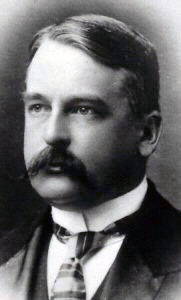Elliott Lewis
|
Sir (Neil) Elliott Lewis KCMG |
|
|---|---|
 |
|
| 19th Premier of Tasmania | |
|
In office 12 October 1899 – 9 April 1903 |
|
| Preceded by | Edward Braddon |
| Succeeded by | William Propsting |
| Constituency | Richmond |
|
In office 19 June 1909 – 9 October 1909 |
|
| Preceded by | John Evans |
| Succeeded by | John Earle |
|
In office 27 October 1909 – 14 June 1912 |
|
| Preceded by | John Earle |
| Succeeded by | Albert Solomon |
| Constituency | Denison |
| Personal details | |
| Born |
27 October 1858 Hobart Town, Tasmania |
| Died | 22 September 1935 (aged 76) Hobart, Tasmania, Australia |
| Spouse(s) | Lina Henrietta Youl |
| Alma mater | Balliol College, Oxford |
| Religion | Anglican |
Sir Neil Elliott Lewis, KCMG (27 October 1858 – 22 September 1935),Australian politician, was Premier of Tasmania on three occasions. He was also a member of the first Australian federal ministry, led by Edmund Barton.
Lewis was born in Hobart, son of Neil Lewis, a merchant, and his wife Anne Maria, née Cox. N. E. Lewis was the grandson of Richard Lewis (government auctioneer) and nephew of David Lewis, colonial treasurer 1878-79.
Educated at the Hobart High School, Lewis took the diploma of associate of arts with gold medal, and was awarded a Tasmanian scholarship. Lewis then attended Balliol College, Oxford University graduating B.A., 1882 and M.A. & B.C.L. in 1885. He was admitted as a barrister in London in 1883 and returned to Tasmania where he was admitted as a barrister in December 1885 and commenced a private practice.
Lewis was elected to the Tasmanian House of Assembly at the 1886 election and remained a member of parliament until 1903. During this time he represented conservative interests and policies in opposition to liberals such as Philip Fysh, Sir Edward Braddon and Andrew Inglis Clark. He served in Henry Dobson's ministry from 1892 until 1894 as Attorney-General, and was Leader of the Opposition 1894–1899. He was also an ardent federalist, having accompanied his predecessor as Premier, Sir Edward Braddon, as part of the Tasmanian delegation to the 1897–1898 convention.
...
Wikipedia
